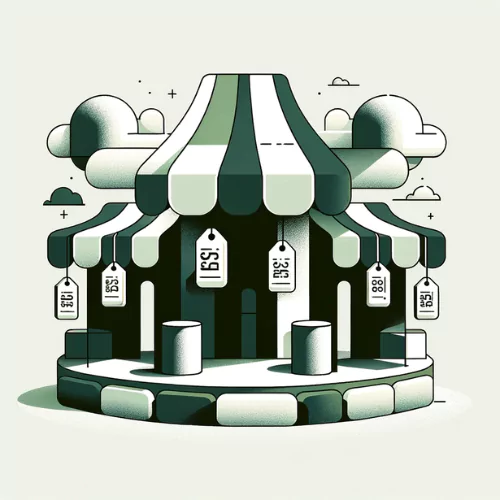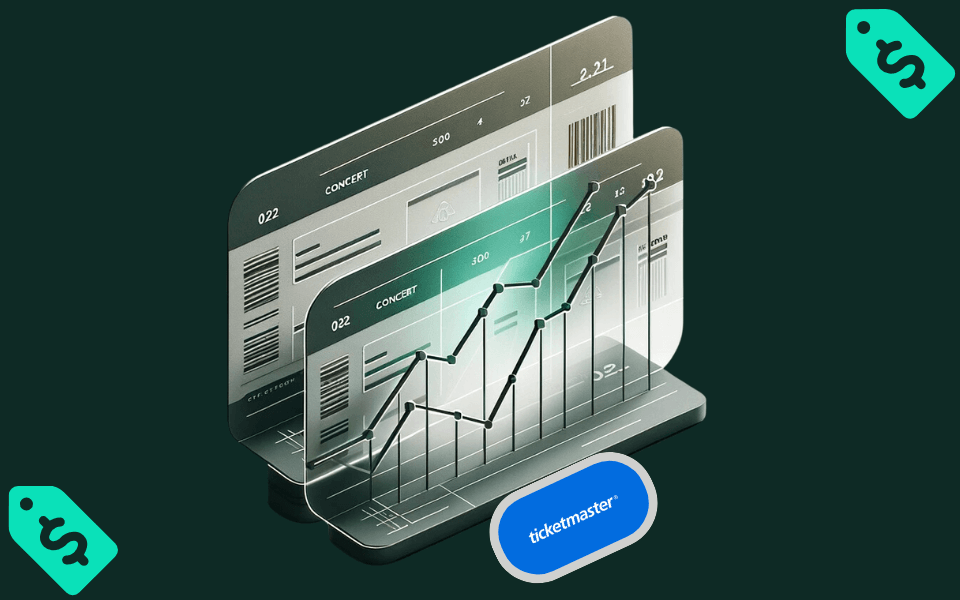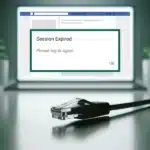Can You Resell Tickets On Ticketmaster For A Higher Price? This is a question many resellers and Ticketmaster users have. And that’s why we researched, read users reviews to give you an accurate 2024 answer.
Commonly known as the “secondary market,” the resale market for tickets is a bustling marketplace that fans often turn to when they’ve missed out on the initial ticket sale or when they can no longer make it to the event. It also allows those who purchased tickets to resell them if they can’t attend, providing a solution for both buyers and sellers.
Table of Contents
- Understanding The Ticketmaster Resale Market
- Can You Resell Tickets On Ticketmaster For A Higher Price?
- Factors That Determine Ticket Resale Value On Ticketmaster
- 1. Event Popularity: Targeting Highly-Anticipated Events
- 2. Seat Location: The Concept Of Ticket Price Breaks
- 3. Timing Of Reselling
- 4. Your Selling Reputation: It Matters
- FAQs and Answers
Understanding The Ticketmaster Resale Market
Within the ticket resale market, Ticketmaster plays a unique role. The platform’s resale feature ensures a safe and reliable avenue for fans to purchase or resell tickets.
Here’s how it works:
- The original purchaser lists their unwanted tickets on Ticketmaster, setting the price they would like to sell them at.
- Once someone agrees to this price and buys them, the ticket is then transferred directly into the new fan’s Ticketmaster account, validating its authenticity.
This feature provides a level of assurance unmatched by most other resale platforms.
The Pros and Cons of Reselling on Ticketmaster
- Pros: Ticketmaster provides authenticated, verified tickets, ensuring the buyer is not scammed. They handle the ticket transfer process, making it easier for the seller.
- Cons: The selling price is often capped to limit excessive profiteering. Ticketmaster charges fees on the transaction which might reduce your net earnings. There might also be limitations on which events the tickets can be resold for.
Can You Resell Tickets On Ticketmaster For A Higher Price?
The short answer is: yes, you can. However, it’s not without certain restrictions and guidelines. According to the Ticketmaster Resale policies, you can list your tickets for sale at any price you choose. That means you can set the selling price higher than what you originally paid.
The catch, however, is that the asking price must still be competitive. Tickets priced too high may not sell at all, because buyers will likely opt for lower-priced tickets.
Note: Although Ticketmaster allows you to set your preferred ticket price, some events or venues may impose a price cap on resale tickets. This is usually to ensure tickets are available at reasonable prices. Make sure you’re aware of any price caps before listing your tickets.
Factors That Determine Ticket Resale Value On Ticketmaster
Your chances for scoring a higher price don’t solely rest on Ticketmaster’s policies or your negotiation skills. There are several factors at play in determining the resale value of a ticket, and these can potentially bump up the price above the original cost. We will discuss these factors one by one.
The most commonly resold events on Ticketmaster are concerts, with a 60% share of all resales.
1. Event Popularity: Targeting Highly-Anticipated Events
You can overcome these issues and sell for higher prices by buying and reselling underpriced tickets for highly-anticipated events, like a major concert tour by a superstar like Selena Gomez. In some of these concerts, there are underpriced tickets priced below $100, which offer substantial resale potential. Targeting these tours can be your profitable strategy.
The theory behind this is simple: the demand for concerts by popular artists like Selena Gomez is usually overwhelming. Fans are often ready to shell out hundreds or even thousands of dollars for access, and this holds true even for the most basic tickets. Thus, if picked strategically, even regular seats can command sky-high prices on the resale market.
2. Seat Location: The Concept Of Ticket Price Breaks
In Ticketmaster, prices often vary by blocks, creating distinct price points for different seating areas. This structure leads to noticeable differences in value, especially when entire sections have uniform pricing.
Consider a scenario where, in one of Taylor Swift’s concerts, you have the option to choose between a seat in row 33 and one in row 11, both priced at $60. The rational choice leans towards the row 11 seat, offering greater value for the same price.
This scenario exemplifies the concept of price breaks, highlighting how they influence consumer choices and perceived value in ticket purchases and in your reselling strategy.
What Does This Tell You As A Reseller?
Tickets in the lower rows, offering better views or experiences, tend to sell out first. This preference aligns with intuitive buyer behavior, where customers seek the best value for their expenditure. In contrast, tickets in the higher rows, despite being in the same price bracket, often remain available for longer due to their perceived lower value.
This buying pattern opens strategic opportunities for resale. By purchasing tickets in the more desirable lower rows early, you can capitalize on their higher demand and sell for higher prices.
3. Timing Of Reselling
Timing is another extremely critical factor. If the event is sold out and you happen to have a ticket to sell a week before the date of the event, your ticket’s value can increase. This is especially true for eager fans who didn’t manage to get their hands on a ticket initially.
More about timing: When Is The Best Time To Resell Concert Tickets? (3 Secrets)
4. Your Selling Reputation: It Matters
Believe it or not, in the ticket resale market. If you have a proven track record of authentic tickets and reliable transactions, buyers may be willing to pay a premium for the security and convenience of purchasing from a trusted seller.
Approximately 30% of all tickets listed for resale on Ticketmaster do not sell

FAQs and Answers
In this section, we will be addressing some of the most frequently asked questions about reselling tickets on Ticketmaster.

Does Ticketmaster Charge To Resell Tickets?
Yes, Ticketmaster does charge a fee for reselling tickets on its platform. For every ticket you sell through Ticketmaster, they take a percentage as a resale fee and any applicable taxes.
This percentage varies depending on the event, location, and other factors, so it’s not a fixed amount across the board. It’s always a good idea to take these fees into account when deciding on a resale price for your tickets. In other words, the ticket resale charge is a financial factor to consider when you’re trying to make a little profit from your ticket investment.
Can You Resell Ticketmaster Mobile Tickets?
Certainly, you can! but it’s important to understand the specifics of the process and any restrictions that might apply. Consider these factors:
- Transferability: Check if the tickets you purchased are transferable. Ticketmaster allows ticket transfer for many events, but not all. Some tickets may have restrictions preventing transfer or resale.
- The Resale Method: Ticketmaster provides two main methods for reselling tickets. listing from your account or listing by barcode. In both methods, the seller can set their own price and enter a payout method.
It’s important to note that for tickets listed by barcode, the payout is typically received within 5-7 business days after the event takes place. Additionally, to resell tickets in the U.S., sellers must have a U.S. bank account and validated tax details - Private Resale and Transfer to Buyer: If the tickets are transferable, you can sell them privately and then transfer them to the buyer’s Ticketmaster account. This transfer ensures the buyer receives a legitimate ticket.
- Legal and Ethical Considerations: Ensure that your resale activities comply with local laws and Ticketmaster’s terms of service. Some regions have laws regulating ticket resale, especially regarding price caps. Example: New York prohibits marking up tickets by more than 10% or $5 above the original cost, while Florida makes it illegal to resell tickets for more than the original price plus fees.
Why Would Ticketmaster Say You Can’t Resell Your Tickets?
There are indeed certain instances when Ticketmaster may prevent the resale of purchased tickets. Reasons for this include:
- Venue and Event Organizer Policies: Ticketmaster is bound by the policies set by the venue or the event organizers. If they do not allow resale, then Ticketmaster must adhere to these instructions
- Resale Platform Restrictions: Ticketmaster’s Resale Platform isn’t available for all events. If the event has not partnered with Ticketmaster for resale, the platform will not be available for reselling those tickets.
- Laws and Regulations: Some states and countries have laws limiting the resale of tickets to certain events or for certain prices. This variability means that in some cases, tickets cannot be resold legally
- Non-Transferable Tickets. Some tickets are marked as non-transferable, meaning they cannot be resold or given to another person. These tickets are usually tied to the original purchaser’s name, which may be checked against their ID at the event. These types of tickets, known as “Will Call” or “Box Office Collection” tickets, are strictly non-resellable through the Ticketmaster platform or elsewhere.
Related Articles
- How To Resell Your Tickets in AXS.com
- Top 5 Mistakes in the ticket reselling business
- Top 10 Ticketmaster Alternatives (Buy & Resell Event Tickets)
- Ticketmaster Waiting Room: Top Tips To Beat The Queues
- Best 5 Ticketmaster Proxy Providers
- When Is The Best Time To Resell Concert Tickets?
- Is Ticket Scalping Illegal? (Laws In Main SU State)
- What Is Vinted: The Reseller’s Marketplace (2024)
- Best 8 Sites To Resell Your Shoes & Sneakers (2024)
- How To Resell Tickets On SeatGeek? (2024 Guide)
- Tags:
- Reselling, Ticketing proxies


